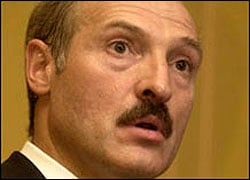A Useful Clash With Belarus
103- Joerg Forbrig, «The New York Times»
- 2.03.2012, 9:59

Europe’s relations with Belarus took a dramatic turn for the worse this week.
In an unusually unified move, the European Union recalled its ambassadors after Minsk showed the E.U. and Polish envoys the door in protest at fresh sanctions on the country’s leadership
The latest escalation exposes Aleksandr Lukashenko’s heightened nervousness and vulnerability. At the same time, Europe seems more determined than ever, and it has now been presented with a rare opportunity to ratchet up its pressure.
For most of his nearly 18 years in office, Lukashenko has been immune to change, whether demanded by Belarussians or by the international community. He abolished the embryonic democracy that emerged in post-Soviet Belarus, taking control of all power structures, squashing dissent, eliminating independent media and driving civil society underground.
Lukashenko has skillfully played Russian and Western interests off each other, extracting cheap oil and gas, loans and trade benefits. But he has always stopped short of giving in to foreign demands, whether the Kremlin wanted closer integration or Europe more democracy.
Lukashenko’s fortunes, however, have begun to change. In December 2010, tens of thousands of Belarussians protested his blatantly rigged reelection. Lukashenko’s response was ruthless: The police beat and detained hundreds, dozens of his opponents were tried on trumped-up charges, and a massive witch hunt ensued against independent journalists and human rights activists.
Shortly after that, the Belarussian economy faced near collapse. The local currency devalued by nearly 300 percent and hyperinflation set in. There was a run on hard currency, durable goods and staple foods. Tens of thousands of Belarussians left to find work in Russia and Ukraine.
Material hardship, in conjunction with repression, quickly undermined whatever support Lukashenko may have had in society. By the fall of 2011, public confidence in him had dropped to 20 percent, according to independent polls.
Clearly worried by the growing discontent, Lukashenko has reinforced his security apparatus, tightened legislation and stressed that he will not permit any change. Yet however menacing he tries to appear in words and deeds, Lukashenko is weaker than ever.
In the West, he has burned all his bridges. Whatever hopes lingered that engagement might nudge him toward change have been shattered. Most Europeans now share the U.S. view that Lukashenko is just a brutal dictator.
Lukashenko’s efforts to draw on fellow autocrats have also come to naught. Qaddafi is gone, Assad and Ahmadinejad are under serious pressure, and Chávez is far away and ailing. Russia has placed strict conditions on further support: It is demanding political integration within a planned Eurasian Union and the privatization of strategic energy assets into Russian hands. For Lukashenko this is not an option: Belarus’s political and economic independence is the cornerstone of his rule.
Lukashenko’s current diplomatic spat with the European Union seems particularly erratic against this backdrop. The Union is the only international partner that does not question Belarussian independence and that can provide the resources needed for Belarus’s economic survival and development.
Now Lukashenko risks the complete severing of ties with Europe in response to a comparably mild travel ban and asset freeze against 21 of his henchmen. His earlier responses to stronger measures seem tame in comparison.
Many in Belarus and abroad are scratching their heads and asking what prompted Lukashenko to go ballistic. Some cite his irrationality, often used in the past to confuse opponents and gain advantage over them. Others see a conscious maneuver to rebuff Europe now with the aim of extracting concessions later. Yet others see a show of loyalty to Vladimir Putin. Whatever the reason, Europe should take advantage of the opportunity Lukashenko has handed it and push for change.
First, the swift and unanimous response by the E.U. to withdraw all its ambassadors from Belarus must have been a surprise to Lukashenko. In the past, he successfully played European countries and their economic interests off against each other to avert a consensus being reached on, for example, sanctions against Belarus.
Second, Lukashenko has given away one of the last levers he had left in his dealings with the E.U. Before, he could expect a normalization of political relations and perhaps some Western assistance in exchange for the release of political prisoners. Now, any further rapprochement should be tied to Lukashenko’s exit from power.
Third, Europe has long struggled to translate its disapproval of human rights abuses under Lukashenko into effective measures against his regime. Its sanctions to date have had only symbolic value. This week’s dispute should be used to impose smart and effective economic measures against individuals and companies financing Lukashenko’s regime.
This has long been a demand of Belarussian democrats, as the European Union is a key destination for Belarussian exports and one of Lukashenko’s main sources of revenue.
Lukashenko may retaliate. He could tighten the screws further on the opposition and take more political prisoners. But whatever he does or threatens to do, the European Union must stand up for the values it claims to hold dear and act decisively for democracy in Belarus.
Joerg Forbrig is director of the Fund for Belarus Democracy at the German Marshall Fund, The New York Times










